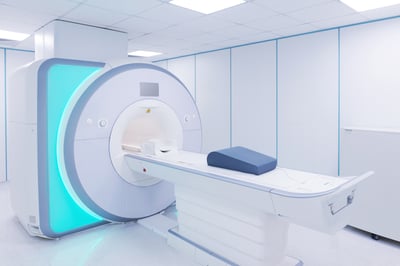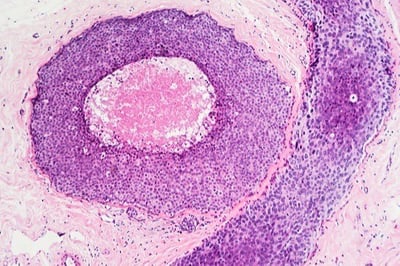FORCE's eXamining the Relevance of Articles for You (XRAY) program looks behind the headlines of cancer news to help you understand what the research means for you.
XRAY is a reliable source of hereditary cancer research-related news and information.
Learn more about the XRAY program
Relevant for: previvors, In portal: Breast Cancer
Relevance: Medium


Research Timeline: Post Approval


Update : FDA updates reported harmful events linked to breast implants
Most relevant for: People who have or are considering breast implants.
The FDA has updated reported cases of breast implant-associated cancer and breast implant illness. Included in this update is approval of a questionnaire that asks about quality of life and satisfaction with breast implants. (10/20/20). Note: On October 27, 2021 the FDA announced stronger guidance on breast implant safety.
Read More
Relevance: Medium-High


Strength of Science: Medium-High


Research Timeline: Human Research


Study : Cancer risk associated with inherited mutations in Lynch syndrome genes
Relevance: Medium-High


Strength of Science: Medium-High


Research Timeline: Human Research


Most relevant for: People with Lynch syndrome mutations
Lynch syndrome is the most common inherited cause of cancer affecting about 1 in 300 people. People with Lynch syndrome have an increased risk of colorectal endometrial and other cancers. A large study followed people with mutations in the Lynch syndrome genes MLH1, MSH2, MSH6 and PMS2 to determine the risk of other types of cancer. (2/21/20)
Read More
Relevance: Medium-High


Strength of Science: Medium-Low


Study : Do hair dyes or straighteners increase breast cancer risk?
Relevance: Medium-High


Strength of Science: Medium-Low


Most relevant for: Young women who use hair dye or straighteners
Many women use products to color or straighten their hair. A large U.S. study linked the use of permanent hair dye and straighteners to increased breast cancer risk, particularly among black women. This XRAY reviews the limitations of this study and highlights the need for additional research before accepting these conclusions. (1/29/20)
Read More
Relevance: High


Strength of Science: High


Research Timeline: Post Approval


Study : Women who exercise have lower breast cancer risk whether or not they have a family history of breast cancer
Relevance: High


Strength of Science: High


Research Timeline: Post Approval


Most relevant for: Young, high risk women
The effect of physical activity on breast cancer risk was looked at in a study of over 15,000 women. The results suggest that exercise lowers breast cancer risk regardless of family history of breast cancer or menopausal status. (12/6/19)
Este artículo está disponible en español.
Read More
Relevance: Medium-High


Strength of Science: Medium-High


Study : Does eating meat affect breast cancer risk?
Most relevant for: Women with a family history of breast cancer
Eating meat has been suggested to increase breast cancer risk. The recent Sister Study looked at meat type, cooking methods and breast cancer risk in a study of 42,012 women. (9/10/19)
Read More.jpg)
Relevance: High


Strength of Science: Medium-High


Research Timeline: Post Approval


Study : MRI or mammograms for detecting breast cancer in families with unknown genetic mutations?
Relevance: High


Strength of Science: Medium-High


Research Timeline: Post Approval


Most relevant for: People with a personal or family history of cancer where no mutation has been found
MRI and mammograms are used together to detect breast cancer in high-risk women who test positive for a BRCA or other gene mutation that increases the risk for breast cancer. For women with a family history of breast cancer but no known genetic mutation, increased screening is recommended. But what method is best? A recent clinical trial in the Netherlands compared MRI and mammography for this population. (8/15/19)
Read More
Relevance: Medium-High


Strength of Science: Medium-High


Study : Diagnosis and treatment delays in young women with breast cancer
Relevance: Medium-High


Strength of Science: Medium-High


Most relevant for: Young women who find a breast lump and young women newly-diagnosed with breast cancer
Young women are more likely to have delays in a breast cancer diagnosis and treatment. Factors that affect these delays include pregnancy, breastfeeding, financial concerns and having a family history of breast or ovarian cancer. (8/5/19)
Este artículo está disponible en español.
Read More
Relevance: High


Research Timeline: Post Approval


Guideline : FDA asks Allergan to recall certain textured breast implants
Most relevant for: Women with, or considering breast reconstruction with implants
On July 25, 2019, the Food and Drug Administration requested that breast implant manufacturer Allergan recall its BIOCELL textured implants and expanders due to an association with a rare type of lymphoma called Breast Implant Associated Anaplastic Large Cell Lymphoma or BIA-ALCL. The FDA does not recommend removing implants for people who do not have disease symptoms. This XRAYS review updates information about this FDA recall. (7/29/19)
Read More
Relevance: Medium-High


Strength of Science: High


Research Timeline: Post Approval


Study : LGBTQ patients recommend improvements for their cancer care
Relevance: Medium-High


Strength of Science: High


Research Timeline: Post Approval


Most relevant for: LGBTQ cancer patients and their healthcare providers.
Very little research has focused on the cancer care experiences of lesbian, gay, bisexual, transgender and queer (LGBTQ) people. This study looks at recommendations from the LGBTQ community for improving their cancer care. (6/20/19)
Read More
Relevance: Medium-High


Quality of Writing: Medium-High


Personal Story : A young woman's story of genetic testing and risk-reducing mastectomy
Relevance: Medium-High


Quality of Writing: Medium-High


Most relevant for: Young women of color with a BRCA mutation
Alejandra Campoverdi comes from a family with three generations of breast cancer. As a former White House aide and active educator in the Latina community, she has openly shared her story of genetic testing, her BRCA2 mutation and her plans for risk-reducing mastectomy at age 39. (6/6/19)
Este artículo está disponible en español.
Read More